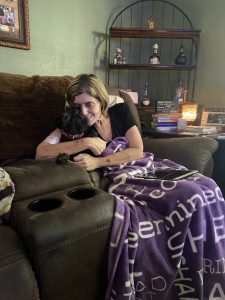Sharing My Struggles as I ‘PHight’ Through Recovery From COVID-19

After several weeks in the hospital due to complications from COVID-19, I couldn’t wait to go home.
On the day of my discharge, I thought the healing process from that and other complications from coexisting illnesses wouldn’t take too long. I gauged this from previous hospitalizations. But what I didn’t consider was all that my fragile body had been through.
As close friends and family members continue to remind me, my body was “PHighting” to stay alive. This reminder puts everything into perspective for me.
Discharge was only the beginning of my recovery.
The day before I went home, it felt strange, yet familiar, as it was the first time in nearly two weeks that my feet touched the ground. My physical and occupational therapists tag teamed me and helped me to a chair only a few steps away. I remember how frail and shaky my body was. This scared me, as did their mention of my going to a long-term care facility for rehabilitation.
As a result, I pushed beyond my means, and then some. I sat up until I was exhausted and in agonizing pain.
The next day, I ate breakfast and got dressed with assistance, ahead of being discharged. I was on cloud nine. But there was a slight kink in my discharge plans: The order wasn’t written to go home, but rather to a long-term care facility.
Tag-team calls helped.
After my husband, Manny, and I made some calls, the covering doctor appeared an hour later. She was in my room for two minutes while Manny waited at a nearby park until I texted him that all was ready.
The situation was tense, and I yelled at staff, telling them I could take my PICC line out by myself. But the nurse said they had been ordered to remove it themselves. Yes, I was acting like that patient. When you have endured so much, you tend to do crazy things.
Finally, I found myself in a wheelchair headed downstairs to meet my husband, whom I hadn’t seen in weeks. The charge nurse decided to wheel me down herself. The closer we got to the exit, the more I could feel butterflies in my stomach. I was ready to jump out of the wheelchair and into my husband’s arms, but unfortunately, I was too weak.
I still remember his smell.
Each minute on the way down felt like an eternity. Once the nurse and Manny had helped me into our Jeep parked outside, I fell into Manny’s chest, crying. I was thankful to be alive and with him. I can still remember how good he smelled.
He would probably say that for the first few days I was home, I smothered him. I just wanted to lie on his chest, smell the familiar scents, and know that I was safe.
The drive home was surreal. Trauma and pain can pop up at any minute, trying to steal joy. Although we had driven that route home a million times, everything looked new. After we pulled into the garage, Manny helped me inside. It was a struggle, but when I finally made it to the recliner, Sasha, our mini schnauzer, jumped on me, licked me, and cried.
For the first few weeks, I struggled.
At home, I could barely walk, so I held onto the walls and the furniture for support. I was weak and shaky, and with assistance, I rotated between my bed, the recliner, and the couch. It wasn’t ideal, but I was grateful to be alive and at home. The agonizing pain made me nauseous.
Manny is my full-time caregiver. He’s been there to help me walk, get out of the bath, and change into clean pajamas. I can’t imagine how exhausted Manny was during my hospitalization, and I hoped he would rest better once I was home. But I had nightmares in which I believed I was still in the hospital, and muscle spasms that kept him awake for many nights.
I am now slowly recovering.
I can deal with the intense level of pain that COVID-19 added to my ongoing chronic pain and other PH symptoms, such as fatigue and dyspnea. But the additional memory loss, brain fog, and anxiety are the worst. When others ask how I am doing, I don’t always have an answer. I usually respond, “I am slowly recovering,” but it is much more complicated than that on most days.
We all react differently to COVID-19. We must continue to do what we can to take precautions and protect ourselves and others. Keep PHighting and pushing through. Together, we’ve got this!
***
Note: Pulmonary Hypertension News is strictly a news and information website about the disease. It does not provide medical advice, diagnosis, or treatment. This content is not intended to be a substitute for professional medical advice, diagnosis, or treatment. Always seek the advice of your physician or other qualified health provider with any questions you may have regarding a medical condition. Never disregard professional medical advice or delay in seeking it because you have read on this website. The opinions expressed in this column are not those of Pulmonary Hypertension News or its parent company, Bionews, and are intended to spark discussion about issues pertaining to pulmonary hypertension.










Ruby Midkiff
Jen, Thank you for helping us understand how horrible Covid is. Pulmonary Hypertension is bad enough by itself. You are one strong woman!
Jen Cueva
Thank you sweet
PHriend. I'm grateful that you thought this was helpfuL. I appreciate you taking the time to read my columns, and sharing and commenting too.
I am strong, but you are, too. Thankful that God continues to bless us both.
Love and hugs,
Jen